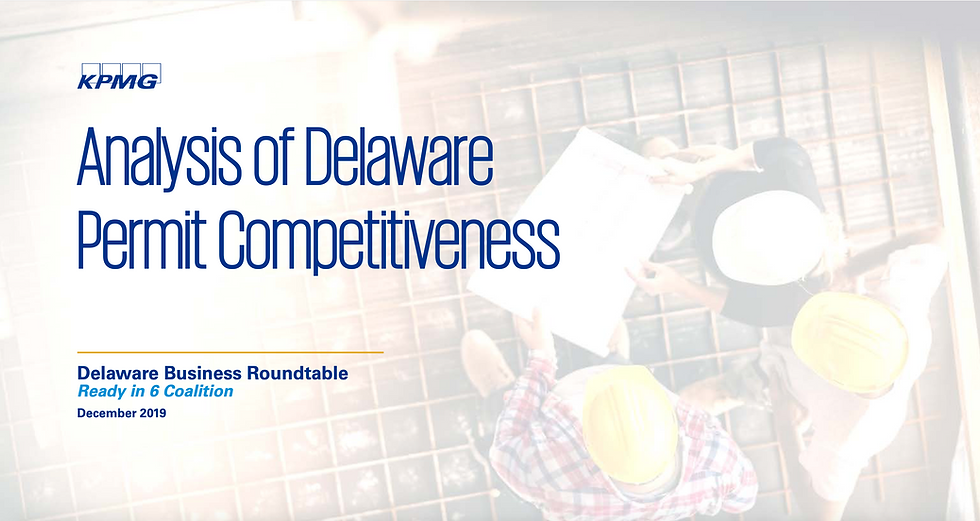Analysis: Delaware’s Permitting Process Makes State Less Competitive, Inhibits Economic Development
- Tony Jewell
- Dec 10, 2019
- 4 min read

Wilmington, Delaware (December 10, 2019) – A new independent analysis of Delaware’s permitting process finds that other states in the region, including Maryland and Pennsylvania, are able to achieve substantially faster permit approvals for businesses wishing to locate or expand in the state. As a result, Delaware is missing significant economic development opportunities in the competition for jobs, talent and investment.
The analysis, conducted by professional services firm KPMG, concludes that Delaware has an opportunity to be more competitive if its permitting processes were strengthened through streamlined communication between state agencies, greater transparency and cost predictability, and a fast-track approval program for high-priority projects, among other recommendations.
“Coupled with low taxes, a prime location and a high-quality workforce, a more favorable permitting environment would make it significantly more likely that Delaware would be more competitive as we work to grow, retain and attract businesses to our state,” said Rod Ward, Chairman, Delaware Business Roundtable and co-chair of the Delaware Prosperity Partnership. “These recommendations should serve as a roadmap for policymakers to develop a more predictable permitting process and a more competitive Delaware.”
The analysis was commissioned by the Ready In 6 Coalition, comprised of Delaware Business Roundtable, Delaware State Chamber, Kent Economic Partnership, Greater Kent Committee, Sussex County Economic Development Action Team, ACEC Delaware, the Committee of 100, the Central Delaware Chamber, the New Castle County Chamber, Delaware Contractors Association, the Delaware Chapter of Associated Builders and Contractors, and the Home Builders Association of Delaware.
The analysis finds, “With significant competition between states for jobs, talent and investment, an efficient permit process is critical to demonstrate a favorable business climate and provide a predictable outcome for businesses seeking to locate or expand in Delaware. Because prospective businesses target locations which can achieve permitting in as few as six months, those states with longer permit timeframes experience reduced interest and missed economic development opportunities.”
Delaware’s permitting process can stretch up to 24 months, placing the state at a distinct economic development disadvantage when it comes to attracting and growing businesses. “In the region, Delaware’s competitors, Maryland and Pennsylvania, are able to achieve substantially faster permit approvals. As a result, Delaware is missing significant economic development opportunities,” the analysis concludes.
The Roundtable and its partners have launched a “Ready in 6” initiative, designed to cut the permitting timeline from 24 months to six months to make Delaware more competitive with other states.
The report recommends state and county leaders improve in three key areas to streamline the permitting process in Delaware: Enhance communication, increase efficiency and reduce paperwork, and track and use data more effectively.
Enhanced Communication
Create a state project concierge to help streamline communication among state agencies. This office would coordinate efforts among agencies to identify opportunities to improve the process and performance of the permitting process.
Create a permitting action committee to assist with the implementation of permit improvements, made up of key state and county stakeholders.
Evaluate the integration of statewide information technology solutions to better integrate the permitting process between agencies and allow visibility to counties, improving communication among government agencies, counties and cities.
Implement permit-focused economic development training for state and county permit stakeholders. This is designed to educate stakeholders on processes and to help them work together seamlessly.
Increase Efficiency and Reduce Paperwork
Create a prioritization program for significant economic development projects to fast track approvals.
Streamline and strengthen the Department of Transportation’s review process to ensure all departments review and provide comments on construction plans during the initial review cycle, providing investors with predictability on issues and costs for proposed projects.
Implement Transportation Improvement Districts (TIDs) in areas experiencing or targeted for significant development to provide investors with greater visibility into the process and cost predictability. The state should expand on existing TIDs and expedite permit review and approval in these districts.
Implement an initiative to pre-package approvals for targeted investment sites, reducing the permitting timeline as issues are known and solved prior to investors making project decisions.
Track and Use Data
State and county agencies should generate data that measures permit process timelines, allowing regulators to develop key performance indicators once historical data is available. Data currently is inconsistently collected by state and county agencies. By collecting and publishing metrics, it would drive increased transparency and accountability among permitting agencies.
Delaware needs to capture more and better economic development data to better understand new, missed and lost opportunities. Historical data needs to be generated to better understand out the state’s permitting process is impacting economic development.
“Taken together, these recommendations will provide efficiency, clarity, transparency and predictability to the permitting process in Delaware – all of which are crucial to helping the state attract and grow businesses,” Ward said. “We look forward to working with state and county officials to make these ideas a reality as quickly as possible.”
View the full analysis here.
About the Delaware Business Roundtable
The Delaware Business Roundtable is a non-partisan, volunteer consortium of CEOs whose companies collectively employ over 75,000 people in Delaware. Since its inception in 1981, the Roundtable’s broad mission is to enhance the quality of life in Delaware by promoting commerce, job creation and select public policy issues. In recent years, the Roundtable has been a leading supporter of public education transformation and entrepreneurs in Delaware.























